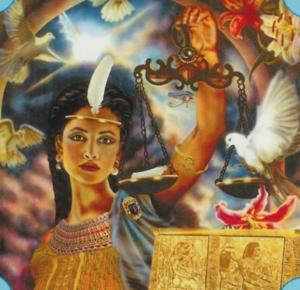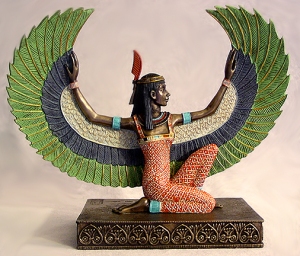The 42 Laws of Ma’at (Egyptian Virtues)
(Image Taken From Maat Shrine)
Ma’at is the Ancient Egyptian Goddess of truth, balance and order. She is most often depicted as a woman with wings or a single white ostrich feather. When the deceased go to the afterlife, the Egyptians believed that their hearts would be weighed against this feather.
If the individual lived a good life, following the rules of ma’at, their heart would be lighter than a feather and they would get to go to the afterlife. However, if that individual did not follow the rules of ma’at, they would have a heavy heart – weighed down by the guilt of their transgressions. As a result, their heart would be devoured by Ammut and the soul would be destroyed.
The laws of Ma’at are called the 42 Negative confessions and they were revealed in the Egyptian Book of the Dead, or the Papyrus of Ani – a book that was written more than 3,000 years ago.
THE 42 NEGATIVE CONFESSIONS
- I have not committed sin
- I have not committed robbery with violence
- I have not stolen
- I have not slain men and women
- I have not stolen food
- I have not swindled offerings
- I have not stolen from God
- I have not told lies
- I have not carried away food
- I have not cursed
- I have not closed my ears to truth
- I have not committed adultery
- I have not made anyone cry
- I have not felt sorrow without reason
- I have not assaulted anyone
- I am not deceitful
- I have not stolen anyone’s land
- I have not been an eavesdropper
- I have not falsely accused anyone
- I have not been angry without reason
- I have not seduced anyone’s wife
- I have not polluted myself
- I have not terrorized anyone
- I have not disobeyed the law
- I have not been excessively angry
- I have not cursed God
- I have not behaved with violence
- I have not caused disruption of peace
- I have not acted hastily or without thought
- I have not overstepped my boundaries of concern
- I have not exaggerated my words when speaking
- I have not worked evil
- I have not used evil thoughts, words or deeds
- I have not polluted the water
- I have not spoken angrily or arrogantly
- I have not cursed anyone in thought, word or deed
- I have not placed myself on a pedestal
- I have not stolen that which belongs to God
- I have not stolen from or disrespected the deceased
- I have not taken food from a child
- I have not acted with insolence
- I have not destroyed property belonging to God
In recent years, a list of 42 ideals was written as a parallel to the Negative Confessions. Some modern practitioners of the Ancient Egyptian Ways like to repeat these 42 ideals in the morning and evening, as way to encourage these ideals in themselves. Chanting was an important part of spirituality in ancient Egypt. It was believed that if you chanted something often enough, that the words would become a part of your being. I guess there really is something to encouraging positive thinking!
THE 42 IDEALS
1. I honor virtue
2. I benefit with gratitude
3. I am peaceful
4. I respect the property of others
5. I affirm that all life is sacred
6. I give offerings that are genuine
7. I live in truth
8. I regard all altars with respect
9. I speak with sincerity
10. I consume only my fair share
11. I offer words of good intent
12. I relate in peace
13. I honor animals with reverence
14. I can be trusted
15. I care for the earth
16. I keep my own council
17. I speak positively of others
18. I remain in balance with my emotions
19. I am trustful in my relationships
20. I hold purity in high esteem
21. I spread joy
22. I do the best I can
23. I communicate with compassion
24. I listen to opposing opinions
25. I create harmony
26. I invoke laughter
27. I am open to love in various forms
28. I am forgiving
29. I am kind
30. I act respectfully of others
31. I am accepting
32. I follow my inner guidance
33. I converse with awareness
34. I do good
35. I give blessings
36. I keep the waters pure
37. I speak with good intent
38. I praise the Goddess and the God
39. I am humble
40. I achieve with integrity
41. I advance through my own abilities
42. I embrace the All

















Very interesting (major) piece of Egyptian history! If only everyone (LOL) or many on our planet could abide by the 42 Ideals… and/or The Ten Commandments. I (personally) feel you don’t need to be ‘holy’ to do so. 🙂 \m/\m/
August 8, 2013 at 11:44 pm
High ideals to live by indeed. I wound need several “feathers” to fly that high every day.
August 9, 2013 at 8:01 am
Seriously! I wonder how any Egyptians got into the afterlife at all with these ideals. However, I also read somewhere that if you recited a certain spell before death…or for the dead…that you could increase your chance of passing the test and getting into the afterlife (cheat codes?). I know early in Egyptian history, people believed that only the pharaohs and other important people got to go to the afterlife. It was only later that this right was extended to everyone. This is an idea that Christianity took from the Egyptians too – the idea that the redemption of God’s Son allowed everyone a chance to have eternal life.
August 9, 2013 at 10:12 am
From what i have read the priests, for a small price, may have read the Egyptian Book of the Dead to the dying much like Tibetan priests read the Tibetan Book of the Dead to them too. And yes Christianity and even Judaism, which came out of Egypt with Moses and Aaron have a lot of Egyptian ideas carried on in their teachings.
August 9, 2013 at 11:18 am
I know I’m a bit late her to respond, but one of the many ideas was also that you could correct the wrongs you did over time depending on how severe, if you lied a lot as a teenager, by not lying, you could counteract the sin and show that you have moved on.
June 8, 2018 at 12:51 am
Pingback: Ancient Egyptian Women – Marriage, Sexuality and Goddesses | Metal Gaia
Pingback: The Original Trinity, Brought to You By Egypt | Metal Gaia
Try Natural Law instead, one rule, do not harm anyone, direct or indirect.
Denfend your right to be safe as a person, defend others and protect yourself and others from theft. And give what you dont need. Then you ARE in heaven, if other follow your example.
October 19, 2014 at 9:26 am
Pingback: Pagan Virtues | Knot Magick
I appreciate you posting this information.
December 8, 2016 at 9:27 pm
You’re welcome! 😀
December 11, 2016 at 11:47 pm
Reblogged this on Vwambanji's Blog.
January 20, 2017 at 12:32 am
This is great for mythology classes
January 27, 2017 at 1:17 pm
what if one person is an upstanding citizen in a community and he died because of assassination but one innocent child was involved?
August 7, 2017 at 5:49 am
This is a very informative post! Thanks for researching this ancient wisdom and sharing with the rest of us. 🙂
September 15, 2017 at 2:05 pm
Why are they considered negative confessions? Are the ten commandments viewed in the same light? You people can’t give credit to black people for anything can you!?
February 27, 2018 at 6:27 am
I didn’t name it that. That’s just what they’ve called it in the sources I’ve read. https://www.ancient.eu/The_Negative_Confession/ I think it’s “negative” not like bad, but since they all say “I have not,” it’s more like negating bad behavior. If you like I could use the other name that they go by as well, “The Declaration of Innocence.”
March 2, 2018 at 11:31 am
Reblogged this on sheila mbele-khama.
July 4, 2018 at 12:51 am
Pingback: Moral and Ethical Systems – Freedom Archive
Pingback: Sekhmet - Egyptian Deity of Death/Healing | Raven Song Esoteric Arts